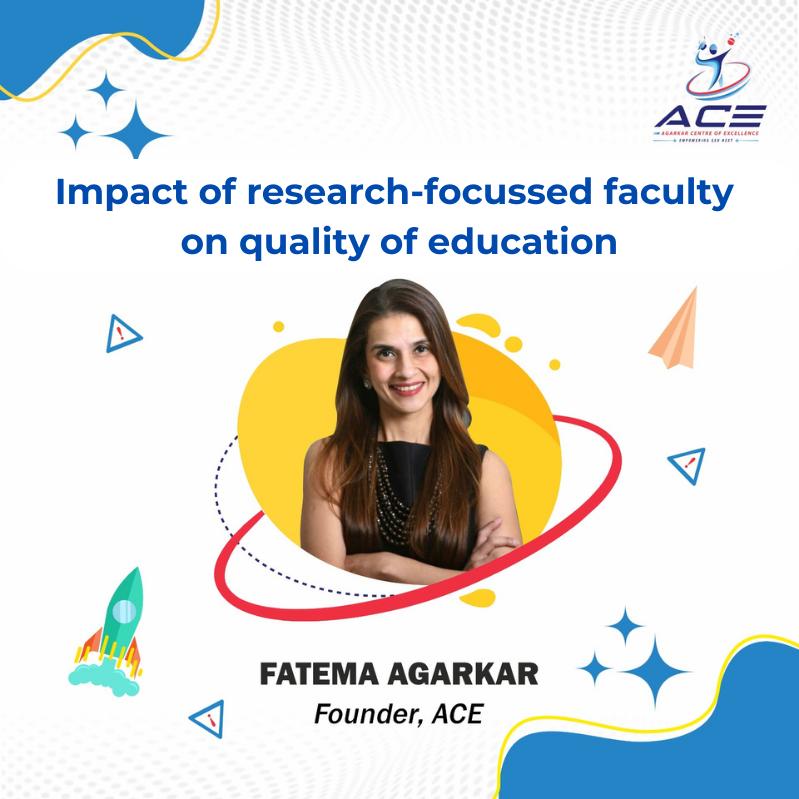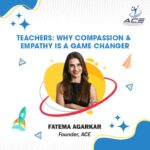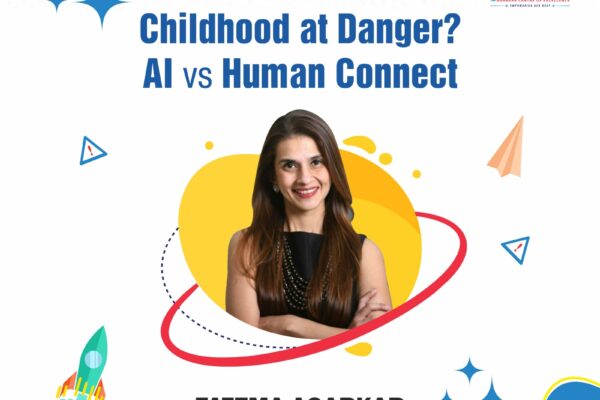In the rapidly evolving landscape of education, the significance of a research-focused faculty cannot be overstated. A research-driven approach empowers educators to innovate, adapt, and provide a high-quality educational experience that meets the needs of modern students. This article delves into the pivotal role of teachers and educators, the challenges posed by traditional teaching methods, and the transformative impact of research and development (R&D) on the K-12 education system.
Role of Teachers and Educators in Formative Years
Teachers and educators play a crucial role in the formative years of a child’s education. They are instrumental in shaping not only the academic skills but also the social, emotional, and cognitive development of their students. During these formative years, educators lay the foundation for lifelong learning by fostering curiosity, critical thinking, and a love for knowledge. Their influence extends beyond the classroom, impacting students’ attitudes, values, and future aspirations.
Gaps Between Traditional Learning Methods and Research-Based Learning
Traditional learning methods have long been characterized by a unidirectional flow i.e. PUSH flow of information from teachers to students. In this model, teachers are the primary sources of knowledge, and students are passive recipients. This approach is structured, predictable, and relies heavily on textbooks and standardized curricula. While it has its merits in providing a foundational knowledge base, several gaps become apparent when compared to more dynamic, research-based learning models.
In contrast, research-based learning transforms the educational experience by positioning teachers as facilitators or guides and students as active knowledge seekers. This PULL approach emphasizes inquiry, exploration, and critical thinking, fostering a more engaging and meaningful learning process, placing the onus firmly on the student’s abilities to assimilate the information that is most relevant to their interests.
The key characteristics can be summarized as follows:
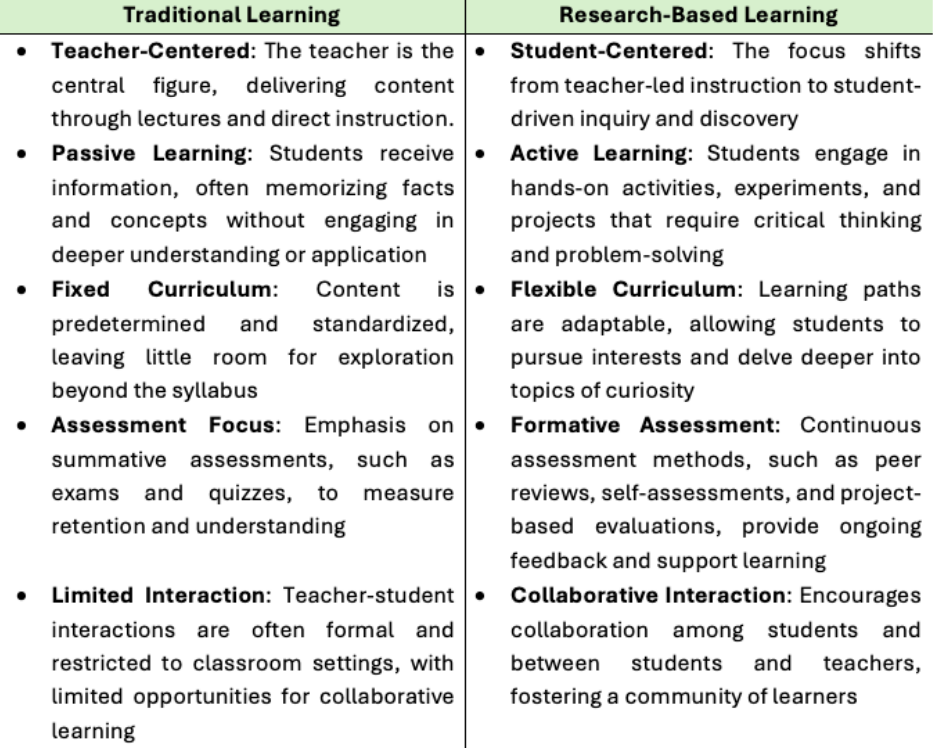
These characteristics give birth to significant gaps between the two learning approaches and amplify the impact they have on shaping the students’ educational as well as professional journeys.
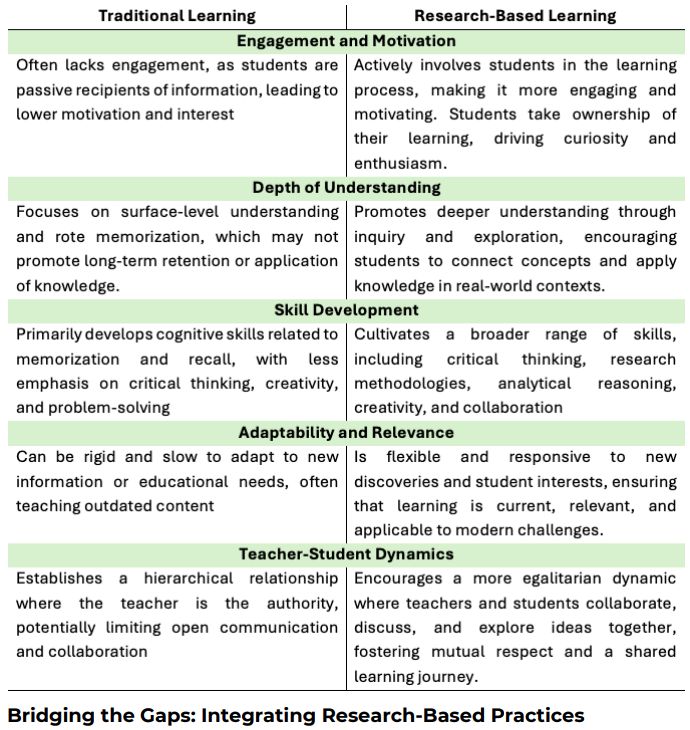
Bridging the Gaps: Integrating Research-Based Practices
To bridge these gaps, educational institutions can integrate research-based practices into traditional learning environments. Here are some strategies to achieve this:
- Professional Development: Provide teachers with training and resources to adopt research-based methods and facilitate inquiry-driven learning.
- Curriculum Design: Develop curricula that incorporate opportunities for research, projects, and interdisciplinary studies.
- Assessment Reform: Implement formative and summative assessments that evaluate critical thinking, creativity, and application of knowledge.
- Collaborative Learning Spaces: Create physical and virtual spaces that encourage collaboration, discussion, and exploration among students and teachers.
- Technology Integration: Utilize digital tools and resources to support research, data analysis, and interactive learning experiences.
Importance of Research for Teachers and Educators to Align with a Dynamic Environment
For teachers and educators to remain effective in a dynamic educational environment and to instill a research focused mindset amongst students, continuous engagement with research is crucial for educators themselves. In the rapidly evolving landscape of the modern world, the disconnect between educators and the non-academic world has become a significant issue. This disconnect can have profound effects on the relevance and quality of education, particularly in subjects that require real-world application and contemporary understanding. The disconnect between educators and the non-academic world manifests in several ways such as outdated curriculum, lack of practical experience, limited industry collaboration and insufficient professional development. However, to simply hold educators alone responsible for this disconnect is incorrect. Several factors contribute to the disconnect between educators and the non-academic world. Institutional Barriers, resource constraints, cultural resistance, workload and time constraints are significant issues that result in this disconnect. However, a resultant impact can be witnessed through the regression of relevant subjects In several critical ways such as outdated content, lack of real-world skills, decreased engagement or empathy, stagnation of innovation and reduced competitiveness.
Research, on the other hand, helps educators stay informed about the latest pedagogical strategies, technological advancements, and educational theories. By integrating research findings into their teaching practices, educators can develop more effective, evidence-based instructional methods. This adaptability is vital in addressing the ever-changing needs of students and the evolving demands of the educational landscape. To bridge the gap between educators and the non-academic world, several strategies in addition to research focus can be implemented such as enhanced professional development, industry partnerships, curriculum reform and incorporating technology.
Benefits of Being a Research-Focused Educator for Holistic Development of Students
Being a research-focused educator offers numerous benefits for the holistic development of students. Research-driven educators are more likely to implement innovative teaching methods that cater to the diverse learning styles of their students. They can create a learning environment that encourages curiosity, creativity, and critical thinking. Additionally, research-focused educators are better equipped to identify and address the individual needs of their students, fostering a more inclusive and supportive classroom atmosphere. This holistic approach not only enhances academic achievement but also promotes the overall well-being and personal growth of students.
Impact of R&D at a school level
Research and development have a profound impact on enhancing the quality of education across the entire institution. Implementing R&D practices within schools can significantly enhance the quality of education, support the professional growth of educators, and better prepare students for future challenges. R&D initiatives lead to the creation of new teaching tools, methods, and curricula that are more effective and engaging for students.
This initiates a loop of continuous improvement and evidence-based practices that further enhance the rubrics necessary to assess the effectiveness of the curriculum. Furthermore, R&D fosters collaboration among educators, researchers, and policymakers, leading to the development of comprehensive strategies that address systemic issues in education. It fosters student-centered learning leading to personalized education and active learning – all essential skills for success at life in general. Overall, R&D contributes to a more robust and resilient education system capable of meeting the diverse needs of students. It promotes innovation, creativity, professional growth of the educators and a reflective, introspective practice. From an administrative angle, R&D allows to bridge the gap between theory and practice aligning the school, its educators and the students with the real-world.
Conclusion
The integration of research into the K-12 education system is essential for enhancing the quality of education and preparing students for future challenges. A research-focused faculty is better equipped to adapt to the dynamic educational environment, implement innovative teaching practices, and foster the holistic development of students. By prioritizing research and development, educational institutions can create a more effective, engaging, and inclusive learning experience that meets the needs of all students. Investing in a research-driven approach is a crucial step towards achieving excellence in education and ensuring the success of future generations.








